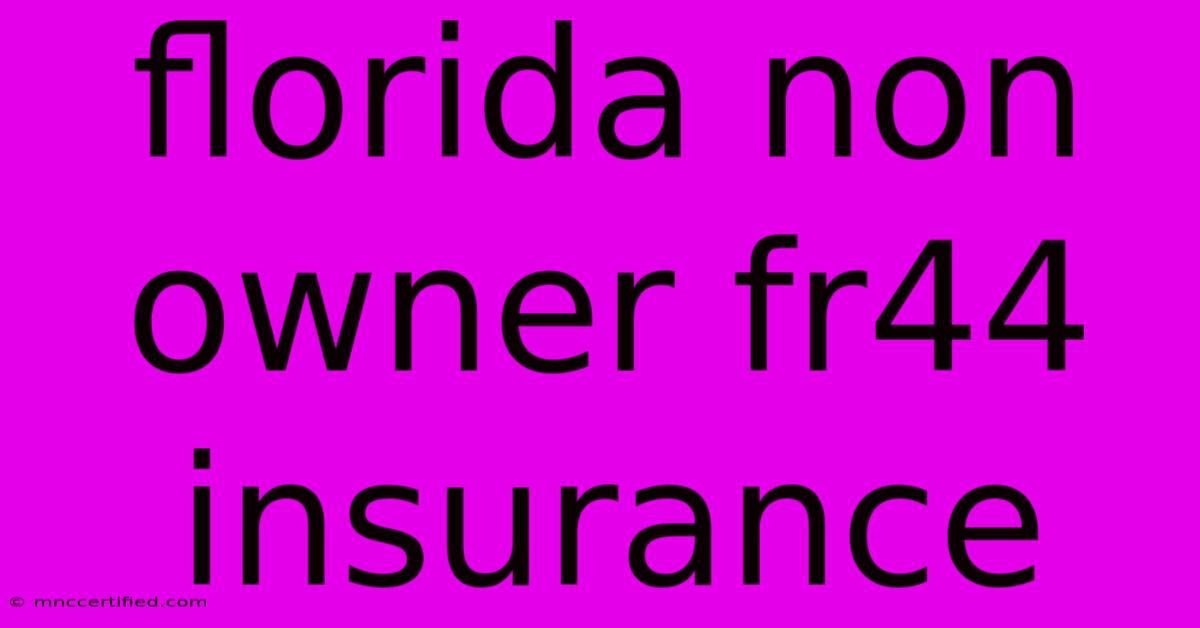Florida Non Owner Fr44 Insurance

Table of Contents
Florida Non-Owner SR-22 Insurance: A Comprehensive Guide
Finding the right car insurance can be tricky, especially if you don't own a car. In Florida, if you've been required to file an SR-22, the process can feel even more complicated. This guide breaks down everything you need to know about Florida non-owner SR-22 insurance, helping you navigate the requirements and find the best coverage for your needs.
What is a Florida Non-Owner SR-22?
An SR-22 is not insurance itself; it's a certificate of financial responsibility. It's proof to the Florida Department of Highway Safety and Motor Vehicles (FLHSMV) that you can meet the state's minimum liability insurance requirements, even though you don't own a vehicle. You need an SR-22 if you've been ordered by the court or the FLHSMV to provide proof of insurance. Common reasons include:
- DUI convictions: A DUI conviction often leads to an SR-22 requirement.
- Serious traffic violations: Multiple moving violations or a serious accident can trigger this requirement.
- License suspension or revocation: Reinstating your driving privileges after a suspension may necessitate an SR-22.
Crucially, a non-owner SR-22 policy only covers you when you are driving someone else's car. It doesn't cover you if you are a passenger or if you are driving a vehicle you do not have permission to operate.
Key Differences Between Non-Owner and Owner SR-22s
While both types of SR-22s fulfill the same legal obligation, there are significant differences:
| Feature | Non-Owner SR-22 | Owner SR-22 |
|---|---|---|
| Vehicle Coverage | Covers you while driving other people's cars | Covers your own vehicle |
| Premiums | Generally lower than owner SR-22 | Generally higher than non-owner SR-22 |
| Eligibility | For drivers without vehicle ownership | For vehicle owners |
Finding Affordable Florida Non-Owner SR-22 Insurance
Securing affordable coverage requires careful research and comparison. Here's how to approach your search:
1. Get Multiple Quotes:
Shop around! Don't settle for the first quote you receive. Compare prices and coverage from several insurance providers specializing in high-risk drivers. Online comparison tools can save you time and effort.
2. Understand Your Coverage Needs:
While an SR-22 fulfills the minimum legal requirement, consider adding additional coverage like:
- Uninsured/Underinsured Motorist: Protects you if you're involved in an accident with an at-fault driver who lacks sufficient insurance.
- Medical Payments: Covers your medical expenses regardless of fault.
3. Maintain a Clean Driving Record:
Your driving history significantly impacts your insurance premiums. Avoid further traffic violations to keep your rates as low as possible.
4. Consider Your Credit Score:
In many states, including Florida, your credit score can influence your insurance rates. Improving your credit score can potentially lead to lower premiums.
5. Ask About Discounts:
Inquire about potential discounts offered by insurers, such as good student discounts or multi-policy discounts.
The Filing Process and Duration
After purchasing your non-owner SR-22 policy, your insurance company will electronically file the certificate with the FLHSMV. This process usually takes a few business days.
The length of time you're required to maintain an SR-22 varies depending on the reason for the requirement. This could range from a few years to several years. Always check your court order or FLHSMV notice for the exact duration.
Penalties for Non-Compliance
Failing to maintain an SR-22 after being legally required to do so can result in serious consequences, including:
- Further license suspension or revocation: Your driving privileges could be suspended again.
- Fines: Significant fines can be levied for non-compliance.
- Difficulty obtaining insurance in the future: It will be harder to secure insurance at reasonable rates in the future.
Navigating the world of Florida non-owner SR-22 insurance can be challenging, but with careful planning and research, you can find the right coverage and comply with the state's requirements. Remember to always compare quotes, understand your coverage needs, and maintain a clean driving record to ensure the best possible outcome.

Thank you for visiting our website wich cover about Florida Non Owner Fr44 Insurance. We hope the information provided has been useful to you. Feel free to contact us if you have any questions or need further assistance. See you next time and dont miss to bookmark.
Featured Posts
-
Insurance Companies In Albany Ga
Nov 21, 2024
-
Insurance For Townhouse With Hoa
Nov 21, 2024
-
Goes West Tracks Atmospheric River Bomb Cyclone
Nov 21, 2024
-
Russias Icbm Launch Targets Ukraine
Nov 21, 2024
-
Urgent Care Covered By Insurance
Nov 21, 2024